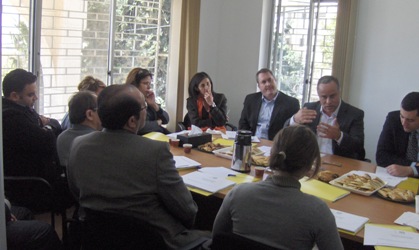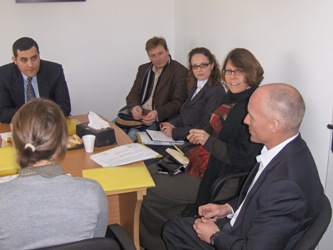Tuesday, 15 March 2011
On the 15th of March 2011, the day when Palestinian youth took to the streets calling for unity and reform, AWRAD organized a roundtable meeting: Palestinian Public Opinion at a Crossroad - Assessment of Potential Youth Revolutions in
AWRAD presented the results of its most recent opinion poll carried out in the West Bank and
The data were analyzed in view of the latest political developments in
The roundtable aimed at synthesizing the historical trends on Palestinian public opinion and connecting the overall changes to the latest events in the Arab world and the potential for similar events in
This was a parallel effort in anticipation of the end of the interim period as agreed in the Oslo Accord, where all final issues must be resolved. The third phase started with the disillusionment at both fronts the internal institutions and the peace process.
The 2000 Intifada was characterized by increasing despair, hardship, violent confrontations and economic decline.
These conditions were leading to the 2006 elections with the Hamas win, triggering an international embargo and dwindling living conditions. After 2006, Hamas gained popularity through garnering sympathy through the (politics of victimization), where its popularity continued to stabilize at a high rate, while that of the PA was hardly making any gain.
This was followed by a reverse trend where Hamas’ popularity was tarnished by its inability to deliver and its actions construed as corrupt and ineffective; a that time the PA and it prime Minster Fayyad was gaining momentum. More recently, disappointment with both the PA and Hamas and their inability to reach a reconciliation agreement led to stagnation in both their support.
Another phenomenon is the shift from a two-way to a three – way politics (Fateh, Hamas and the many facets of independents), with a softening of positions on most issues by all groups.
Having said all of that, Dr. Said argued that the current map of Palestinian politics is not as conducive to overarching actions against the current political system as the case in other Arab countries.
This is due to a number of factors including the overcrowded agenda including the principal concern of Palestinians to establish an independent state, the already politicized youth with as much as 60 percent of them having party affiliation (either Fateh or Hamas), and the inability to the independents to come together to induce sufficient momentum for change.
Dr. Said's presentation was followed up by a commentary by Mr. Owen Kirby, an expert in opinion polling from IRI, who questioned the possibility for a third way, as the data reveal no significant variation in attitudes based on age, gender, education and geography.
The (independents) are not a homogenous group, and not sufficient studies were conducted on that issue. That group must be further explored.
The roundtable took place on Tuesday, 15 March 2011 at AWRAD's Home in Ramallah.



